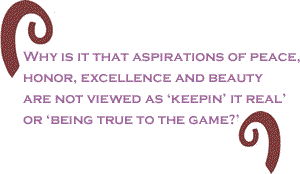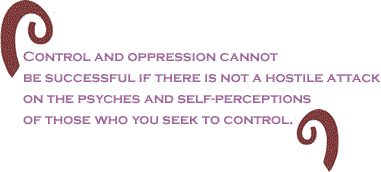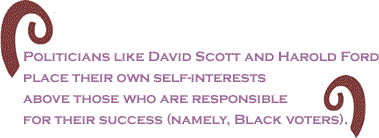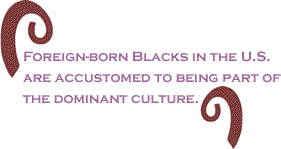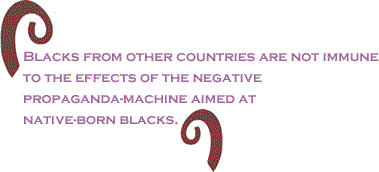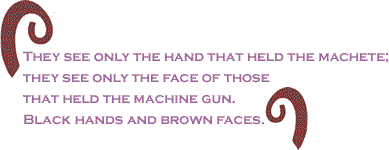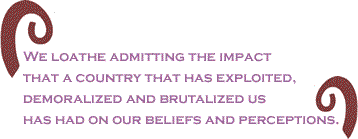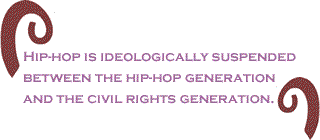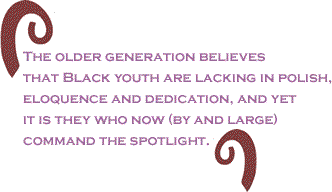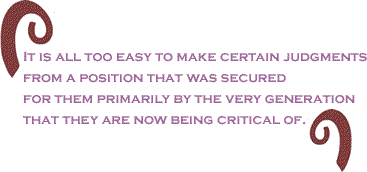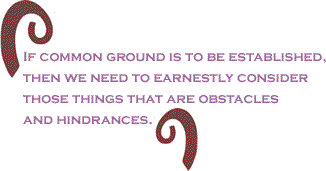
|
|||||||||||||||||||||
 |
Introduction The recent goings-on at certain college campuses and the on-going dialogue about what it means to be black have compelled me to contemplate the issues of Black Identity and Black Studies. There are a great many challenges that face us (especially here in the U.S.) as a people in our search for clarity and insight into these complex matters. Within this text I will not claim to have “solved” the riddle that is Blackness, nor will I assert that I have achieved the answer to what constitutes the perfect higher education Black Studies program. However, I do believe it would behoove us to investigate the hindrances that have impeded our progress and the barriers that obstruct our ability to clearly articulate and define our views and positions regarding these difficult issues. There is always an inherent danger in trying to define any group of people too broadly. We as Blacks and as peoples of African descent are not immune to this danger. Since the beginning of Black captivity and enslavement, a great emphasis has been placed on identity – how Blacks are viewed by society as a whole (i.e. the dominant white culture) and how Blacks view themselves. Control and oppression cannot be successful if there is not a hostile attack on the psyches and self-perceptions of those who you seek to control (a perception of irreversible and inherent inferiority in the mind of the oppressed), while simultaneously fashioning a social construct of white superiority and supremacy that touts the virtues of whiteness and Western Civilization, as well as qualities and attributes that were and are deemed impassable for Blacks. This external assault on Black self-perception creates and lends itself to the internal difficulties that prevent us from developing a healthy, relevant and multi-lateral Black identity here in the United States. Internalized oppression This phenomenon is seen time and time again in a number of behaviors in abused and neglected children, battered women, unhealthy relationships etc.: The oppressor or abuser begins a cycle that the abused and oppressed continue. Internalized oppression has been the primary means by which we have been forced to effect and “be in accord” with, our own oppression. Toni Morrison, Richard Wright, Alice Walker, James Baldwin and the like, have written volumes about Black self-loathing and self-hatred.
It manifests itself in various ways. Some of these forms are subtle: petty jealousies, inability to appreciate the success of other Blacks, Blacks who are “better off” (materially, educationally, financially) acting as if they are better than other Blacks, equating low achievement with being Black, the feelings of inadequacy (“not being good enough”) that prevents many of us from even attempting to be a catalyst in our own emancipation. Other forms are more destructive and impact Blacks on a mass scale: the self-hating psychosis that has led an untold number of Black folk down the road of self-abasement and self-mutilation (they were told by other Blacks: “your nose is too wide,” your lips are too big,” “your skin is too dark”), Ward Connerly’s and Clarence Thomas’s attacks on programs such as affirmative action, politicians like David Scott and Harold Ford who place their own self-interests above those who are responsible for their success (namely, Black voters) and leave them prey to the racist and inequitable forces poised to overwhelm them. Even here at the university where I currently serve as an administrator and visiting faculty, I have witnessed this self-destructive phenomenon. A core group of 10-15 “Black” students' first militant act was to attack, slander and call for the resignation of an accomplished and gifted Black female administrator and faculty person (who by the way, has received nothing but favorable job evaluations), while at the same time denouncing the university for its “lack of diversity and Black faculty.” As this drama unfolded this “student” protest was traced back to other Black faculty and administrators who prodded and provoked these students to harass this particular Black administrator. Her only “crime” was to conduct herself with integrity and raise the bar for the students who have passed through the multi-cultural center she directs (students that are predominantly Black). The petty jealousies and resentments of these Black administrators and faculty were imparted to the students, which in-turn has become a malicious campaign of harassment and persecution.
At present not one white administrator has been targeted or has been asked to resign. To date, not even one cross or unfavorable word has been spoken against a white administrator by this faction. On the contrary, they have aligned themselves with certain white entities on the campus that have never been friendly to the interests and concerns of Black people. This particular example is not only rife with cowardice, abuse of authority and manipulation, but it speaks to the depth and breadth of the internalized oppression that makes some of us co-conspirators against our own interests. At present, this matter is under investigation. Patterns of internalized racism cause us as Blacks to find fault, criticize, and invalidate each other and in the most extreme cases, undermine each other. Internalized oppression also causes us to have unrealistic expectations of one another. By this I do not mean that every disagreement, debate or dispute should be construed as internal oppression. Honest debate and righteous dissent is not only good but necessary for progress. However, when we work as agents or facilitators (with suspect and malicious motives) in the demise of other Blacks, then we are perpetuating and guilty of internalized oppression. An ever-changing, multi-national Black population The percentage of those with black skin who are foreign-born in the US rose from 4.9 percent to 6.7 percent between 1990 and 2000, according to Census Bureau data analyzed by Susan Weber of Queens College, as reported in the New York Times on August 29, 2004. With this influx of a foreign-born Black population, it is inevitable that it would lead to certain intra-cultural conflicts. Foreign occupation, slavery and colonialism have impacted Blacks all over the globe, but Blacks born outside of America have their own perspective of these occurrences. Sometimes these perspectives differ or run contrary to those of US-born Blacks. The views of Blacks born in America are usually shaped by this particular country’s history of discrimination and racism. African-born and Caribbean-born immigrants also come from countries where people are physically homogenous. Because of visa requirements and immigration restrictions, they often arrive here with skills that immediately spring them into the upper echelons of business. They come from countries governed by people who look like them. Foreign-born Blacks in the U.S. are accustomed to being part of the dominant culture. They may have some understanding of what it means to be a “minority” when it comes to political or social power, however, in terms of phenotype they rarely do. In other words, they hail from a different reality than native-born Blacks. As a matter of fact, according to the data from the 1992-1995 National Health Interview Survey which described the differences in socio-demographic and health characteristics of the non-Hispanic U.S. population categorized by race (black and white) and nativity (immigrant and native), the health of foreign-born blacks was comparable to that of U.S.-born white persons in most cases, and, in some cases, better than the health of foreign-born white persons. Over 67% of the foreign-born black population assessed their health as being excellent or very good. This was significantly greater than the 52% of their U.S.-born counterparts who assessed their health as excellent or very good and similar to the proportions of U.S. and foreign-born white persons who rated their health at that level (69% and 62%, respectively).
This is due in part to certain related factors. Foreign-born and U.S.-born Blacks’ economic and educational statuses are vastly different according to the U.S. Census Bureau’s 2000 report. Fifty-seven percent of foreign-born Black families had a household income above $20,000, compared with the 45% of their U.S.-born counterparts. In addition, foreign-born Black populations were more likely to be currently employed; 64% of foreign-born Black persons, as compared to 57% of native-born Black persons. This same report also showed a difference in the percentage of native-born and foreign-born Blacks 25 years and over who had attained a BA or BS: US-born Blacks:16.5% , foreign-born Blacks: 24.3%. These discrepancies, at times, lead to intra-cultural conflict between foreign-born and native-born Blacks. Blacks from other countries are not immune to the effects of the negative propaganda-machine aimed at native-born blacks. This leads some foreign-born Blacks to buy into the harmful stereotypes, which leads to (what appears to be) a concerted effort on the part of the African-born population to distance and distinguish itself from US-born Blacks. This creates an “intra-cultural chasm” that gives birth to the not-too-often discussed (at least not openly) belief that many American-born Blacks have about foreign-born Blacks (especially those who hail from continental Africa): “They think they are better than us.” Under these tense and somewhat hostile circumstances, it is extremely difficult (if not impossible) for a unified and all-encompassing Black identity to emerge. The Brutalization of Blacks in Countries Governed by Blacks Those of us who have studied and understand history realize the role that Western civilization has played in the subjugation, enslavement and colonization of Black people and Black nations. The rape, devastation and plundering of natural, as well as human resources, have been thoroughly documented. However, we as human beings (at times) can have short memories. We have the flawed tendency to analyze and judge our current circumstances, with virtually no examination of their causes.
This must be remembered when we as American-born Blacks interact with those from places such as Somali, Liberia, Haiti, Rwanda and the Sudan. After the violence and slaughter that they have experienced in their homelands, America begins to take on this almost magical appeal. Also, more often than not, the face or faces of the aggressor have looked like them. US-born Blacks have much less difficulty in seeing the white privilege and white supremacy that is endemic in American society than their foreign-born counterparts. And although the fingerprints of Western colonization and manipulation can be found all over the problems that plague the peoples of Africa and the African Diaspora, the visible instruments used to oppress, murder and brutalize have been Black as well. To convince the Rwandan who narrowly escaped extermination; or the native of Darfur in the Sudan who has been orphaned by that region’s blood-letting; or the Haitian that has been scarred by decades of violence, that we as Blacks are “one” can be a tough sell. The more enlightened amongst us know that in a puppet show it is those who are pulling the strings who are ultimately in control, yet the vast majority of Blacks (including American-born) are oblivious to the strings; they see only the puppets. When they recall the rapist; the executioner; the corrupt law enforcement officer; the governor and/or president, their recollections are in black or brown. They see only the hand that held the machete; they see only the face of those that held the machine gun. Black hands and brown faces, brown hands and Black faces. We Are More ‘American’ Than We Are ‘African’ This is not a stinging indictment, nor is it a ringing endorsement, but simply a statement of fact. It should be thoroughly understood, however, that we as Blacks have influenced America, just as much as America has influenced us. This nation has benefited greatly from our contributions (intellectual, social, technological, political) as a people. Nevertheless, there has been a reluctance or lack of realization on the part of native-born Blacks or African-Americans to admit the influence that American culture has had on their lives. We loathe admitting the impact that a country that has exploited, demoralized and brutalized us has had on our beliefs and perceptions about: success, beauty, value and life. The same ills, dysfunctions and maladies that are pervasive in the U.S., have not passed the Black community by. The hell that we have caused countless Black men and women to go through because they didn’t measure up to some “white-American” standard of beauty or success is incalculable. It is all too painful for the abused to see the abuser in themselves. Nevertheless, there it is just underneath the surface. Furthermore, the xenophobia that has been a staple in American history and culture has reared its ugly head time and time again in the American-born Black community. “They’re taking our jobs” or “they don’t even know how to speak English,” are not only mantras spouted by whites about illegal aliens, but these same words can also be heard dripping from the lips of native-born Blacks in regard to our foreign-born brothers and sisters. For far too many years, and far too many times, we (American-born Blacks) have engaged in that all too American (and all too white) practice of disregarding and de-valuing cultures other than our own. The Black Generation Gap Note: When I speak of the older generation, I am speaking of those ages 50 and up. When talking about the younger or current hip-hop generation, I am looking at those between the ages of 16 and 30. The Black generation gap is a difficult actuality that has become increasingly evident. At times it appears to be an all-out cultural war. This gap can be seen in the differences the younger (or the hip-hop) generation has with older Blacks when it comes to leadership, goals and values. Older Blacks often complain of younger Blacks' viewpoint on social values, clothing, hair, music, lifestyle, family, race and career. Meanwhile, young Blacks often see their parents' views as old-fashioned and say they feel misunderstood by their elders who lecture more than listen. They are also tired of the current Black leadership, which often talks about civil rights victories and a past that they feel is irrelevant in today’s world.
Christopher Tyson attempts to tackle this dynamic in his essay “Exploring The Generation Gap: And Its Implications on African-American Consciousness.” In it he asserts that hip-hop is ideologically suspended between the hip-hop generation and the civil rights generation, which fundamentally leads to an inability to develop Black political power, economic organization, and overall race consciousness (although, there are some who assert that in the early years of hip-hop, there were elements from the Black Power Movement – seen in groups such as Afrikka Bambaata). Tyson goes on to say that because of the civil rights generation’s rejection of hip-hop in its early development, they “forfeited the opportunity to mold the activist potential in the new culture” – therefore leaving this ideological vacuum or generation gap that is present in hip-hop music and the younger generation. Furthermore, this disconnect between the civil rights generation and the hip-hop generation thwarted the ability of Afro-centric and politically and socially conscious rap groups such as Public Enemy, De La Soul, Arrested Development, X-Clan, A Tribe Called Qwest to sustain the long-term success and influence that their music and message merited. I believe that both the civil rights and hip-hop generation need to acknowledge the errors that have caused this rift. The older generation has engaged in dangerous attitudes that have hindered their ability to influence the younger generation: low expectations and empty praise. Like our current President, our young people at times have been the beneficiaries of low expectations. In some circles it appears that Black leadership has associated avoiding prison or drugs as a mark of excellence. Although successfully avoiding the snares of drugs, gangs and crime is positive and commendable, we need to begin instilling in the minds of the younger generation that this should be standard behavior. Honest and fair dialogue with the younger generation will go a long way in bridging the generation gap. Empty and vain praise for sub-par efforts and endeavors is to no one’s advantage. It prevents the recipient from achieving their full and intended potential and leads to a false sense of accomplishment. It also makes any person who honestly critiques their work seem like either a lunatic or naysayer. That which is gained cheaply, is held lightly.
Disregard, envy and disrespect: this is the opposite extreme to low expectations and empty praise. It appears, at times, that the older generation has declared war on its younger counterparts. Perhaps it is the frustrations of the older and/or civil rights generation that prompts this, for lack of a better word, enmity. Frustration about, what appears to be, the failure of the hip-hop generation to live up to the perceived promise that was available to them after the gains of the Civil Rights Movement. However, this disappointment has often manifested itself in the form of utter disregard and disrespect for anything that is achieved by the younger generation. Instead of validating the portion of their accomplishments that has real value and caringly offering their wisdom and insight to address the aspects with which they have concerns, the older generation, at times, condemns or disregards their young foils’ achievements completely. Envy may also play apart in this on-going antagonism between the two generations. The $100 and $200 million contracts of young Black athletes, the exorbitant record deals of Black men and women barely out of their teens, has the potential of rubbing more than a few Black elders the wrong way (especially those who have toiled long and hard doing “serious” work in the Black community). The older generation believes that they are lacking in polish, eloquence and dedication, and yet it is they who now (by and large) command the spotlight. This reality has created an antagonism between the two that has not allowed the young to benefit from the experience of the experienced.
Hypocrisy, mixed-messages and double-standards. No other saying has generated more generational conflict than the tried and true: “Do as I say and not as I do” – and this holds true in the Black community as well. The leadership of the civil rights generation, of late, has decried the excesses, indulgences and self-gratifying lifestyles of hip-hop and the current hip-hop generation. The tricked-out rides, the fat platinum and gold chains and the diamond and gold studded dentistry have increasingly come under fire. However, what is being said about the corporate kick-backs, the governmental pay-offs and under-the-table money that is being channeled through the coffers and pockets of certain Black elected officials, politicians and religious leaders? Save a select few publications (such as BC), not much. The younger generation is not completely ignorant of this glaring contradiction and double-standard. Furthermore, the vast majority of the Black middle and upper-class (peaking in the mid 80’s to early 90’s) appears to have been worshipping at the altar of the god of materialism. When fulfillment is consistently and largely portrayed in terms of possessions, wealth and status, should we be all that surprised by the bling-bling mentality that has taken hold of the existing hip-hop generation? What Black Youth Must Answer For The younger generation has a few issues that they too must come to terms with. Chief among these concerns are: rejection of the older generation’s values without sufficient replacements. The hip-hop generation has had much to say about the civil rights generation’s perceived “selling out” of the Black community. They also speak of the older generation being out of touch and out of step with the times. While some of their assertions may have merit, it is all too easy to make certain judgments from a position that was secured for them primarily by the very generation that they are now being critical of. Also, it is rather ironic that the economic boon of the hip-hop artist has not really helped to answer the economic inequities within the hip-hop generation itself. If there are some in the older generation who have indeed “sold-out,” then there are many in the hip-hop generation who never “bought-in.” In other words, they have never made a real investment in the Black community. They have never made any meaningful sacrifices. Their beliefs have never cost them anything because they have operated, by and large, without a clear set of principles. To have no beliefs (or superficial ones) is not a satisfactory alternative to what is believed to be out-dated values. Yet, by not believing in anything it absolves the unbeliever of any responsibility or accountability – without which we have no real hope of unity or identity. 5 x 5 = 25 does not cease to be true just because it’s an “old” idea. There are standards that are timeless, and there are values that have no expiration date.
We must address the general lack of critical thought: In teaching Philosophy to college-aged young people, I must admit that their inability to think critically never ceases to amaze me. I must also add that their capacity to learn how is what keeps me teaching. Nevertheless, there exists a deficit in critical thought amongst our younger generation. By this I do not mean they are stupid or dumb, but rather unaware. Critical thought requires being able to make certain connections and draw certain parallels. Without an understanding of the past, without a clearly defined foundation from which to reason, the current hip-hop generation is largely incapable of making these needed connections and parallels. That understanding of the past and that foundation could be provided by the older generation that they seem to be constantly at odds with. This scarcity in critical thought also prevents the young from having the wherewithal to properly assess where certain actions might lead. In other words, they are left without an appropriate understanding of the concept of “consequences.” Racism is real; discrimination is real; accidents, twists of fate, circumstances beyond our control are very real also. However, the actions that the younger generation usually views as punitive, disciplinary or unfair, has more to do with consequences than any thing else. Consequences that could have been avoided if they were more adept at critical thinking. Another Inter-Generational Point of Contention Defining “keepin’ it real” as: disrespectful, misogynistic, hedonistic or violent. In our recent history, there have been very few things more destructive to the younger generation that the “that’s just the way I am” or “I’m just keepin’ it real” posture. Ultimately this argument is used when justifying some negative behavior (granted, “Just keepin it real” has been used by people of immense integrity when defending their position on particular issues). Certain attributes are intrinsically a part of who we are, while other characteristics are the result of conscious choices that we have made.
The devaluing of relationships; the glorification of lifestyles and behaviors that denigrate, rather than uplift the Black community as a whole, is not a matter of “being real” or being true to who one is fundamentally. It ultimately comes down to who we have chosen to be and what reality we have elected to live in. “Keepin it real” or “being true to the game” has been translated into the justification for all manner of hedonism, misogyny and violence. It is because of the previously mentioned “values vacuum” that such actualities exist. It is because of the afore-mentioned lack of critical thinking that a generation has not been able to acquire the skills that empower them to choose and develop the qualities that help them become who they are “supposed” to be, instead of relying on the weak and careless security blanket of: “that’s just the way I am.” Cowardice, indifference and ignorance are all realities, but they are chosen realities and they most assuredly are not the only realities. How then does “keepin’ it real” come to mean some of the ugliest and most shameful characteristics in the human experience? Why is it that aspirations of peace, honor, excellence and beauty are not viewed as “keepin’ it real” or “being true to the game?” In his song African Dream, rap artist Talib Kweli opines: “These cats drink champagne to toast death and pain like slaves on a ship talking bout who got the flyest chains.” The generation gap within the Black community has nurtured this flawed understanding of reality by many in the younger generation.
I do realize that there are scores of individuals in both the older and younger generations who have been pro-active in trying to bridge this generation gap. I also realize that not every person in the older or younger generation engages in the attitudes and behaviors detailed above. However, if common ground is to be established, then we need to earnestly consider those things that are obstacles and hindrances to our efforts. Conclusion Recently I was speaking to a Sudanese law student and the conversation came around to Darfur. He told me that the main problem in that region was the issue of identity. Will Darfur be a Muslim or African state? How will the citizens of Darfur be defined? I suppose that is the point that I was attempting to touch on and examine in this essay. Identity is not an insignificant thing; it is a matter of supreme importance. I have not proposed many answers in this text. On the contrary, I have probably succeeded in creating more questions and I am perfectly fine with that. It has long been my belief that we have failed to find the right answers because we have failed to ask the right questions. So let us begin there, together. In doing so we will undoubtedly have to confront some uncomfortable truths and some unpleasant realities, but this should not deter honest, thorough, sincere and uncompromising discussion and examination. Defining who one is, is an innate need. For by defining one’s self we discover our purpose, and by discovering one’s purpose we can began to realize our destiny. This is true of the individual and it is true of a people. Dr. Edward Rhymes, of New Bedford, Massachusetts, is a consultant in the areas racism, equity & diversity, education and adolescent development. Be sure to check out the Rhymes Reasons page on his website, http://mysite.verizon.net/vze48hqr/rhymesworld |
Your comments are always welcome. Visit the Contact Us page to send e-Mail or Feedback or Click here to send e-Mail to [email protected] e-Mail re-print notice
If you send us an e-Mail message we may publish all or part of it, unless you tell us it is not for publication. You may also request that we withhold your name. Thank you very much for your readership. |
| April 14 2005 Issue 134 |
|||||||||
|
|||||||||
|
|
|||||||||
| Printer Friendly Version | |||||||||
 |
|||||||||
 |
|||||||||
| |
|||||||||
| |
|||||||||





















